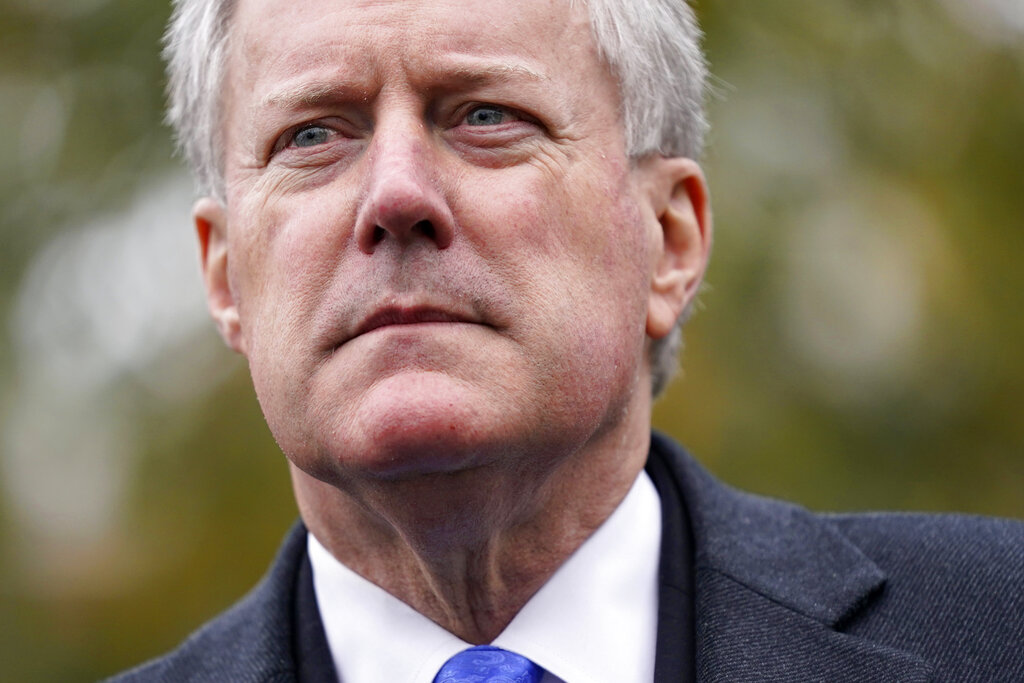A federal judge signaled his intent to issue a quick ruling in former White House chief of staff Mark Meadows‘s challenge of Jan. 6 committee subpoenas against him.
U.S. District Judge Carl Nichols claimed he would reach a decision “appropriately quickly” following a hearing on the matter Wednesday, CNN reported. Meadows is suing to invalidate subpoenas from the Jan. 6 committee, citing former President Donald Trump‘s assertion of executive privilege.
GEORGIA PROSECUTOR DEMANDS MARK MEADOWS AND SIDNEY POWELL TESTIFY
Nichols declined to issue an immediate ruling in the case during the hearing and chided the Jan. 6 committee for harping on the fraught issue of executive privilege in its legal arguments instead of relying on the debate clause in the Constitution, according to Politico.
“Here we are in the exact same procedural posture as cases in which the privilege has been asserted down the hall, so to speak,” Nichols exclaimed in frustration during the hearing, per Politico.
The debate clause shields lawmakers from certain legal liability while acting in their capacity as legislators, and Nichols argued a debate clause argument would’ve been a more straightforward case to litigate, according to Politico. He also underscored that he is not able to compel Meadows to testify before the panel, Politico reported.
Meadows first filed a petition in the matter last year, arguing that the subpoenas against him were “overly broad” and “unduly burdensome” and insisting the panel lacked the legal authority to subpoena him.
Last year, the Jan. 6 committee subpoenaed Meadows for testimony and documents, arguing that he had knowledge about Trump’s gambit to challenge the 2020 election. A subpoena against Meadows cited reports that the former president’s top aide was “engaged in multiple elements of the planning and preparation of efforts to contest the presidential election and the counting of electoral votes.”

A lawyer for Meadows negotiated with the Jan. 6 panel for weeks as Meadows turned over some documents to the committee. For example, a trove of text messages from Meadows to key players in Trump’s orbit leaked to the public after the subpoena was issued.
Meadows argued that Trump’s assertion of executive privilege precluded him from answering certain questions from the committee and turning over certain documents.
His attorney, George Terwilliger, told the Washington Examiner last year that Meadows would “work with the Select Committee and its staff to see if we can reach an accommodation that does not require Mr. Meadows to waive Executive Privilege.”
Meadows ultimately declined to appear before the panel last year. As a result, the panel recommended Congress hold Meadows in contempt. Congress ultimately followed through on the recommendation and voted to hold him in contempt last December.
CLICK HERE TO READ MORE FROM THE WASHINGTON EXAMINER
The matter was then referred to the Department of Justice, which declined to pursue a contempt case against Meadows or former White House deputy chief of staff Dan Scavino. This contrasted with the DOJ’s pursuit of contempt charges for Steve Bannon and former White House adviser Peter Navarro, who similarly bucked Jan. 6 committee subpoena requests.
Bannon, who was not a member of the Trump administration during the time period in question, was found guilty of contempt charges in July. Nichols was the presiding judge in that case. Bannon is set to face sentencing in October, while the charges against Navarro are still pending trial.
In addition to his spat with the Jan. 6 committee, investigators in the Fulton County inquiry on the 2020 election are seeking testimony from Meadows to gain insights into a call he helped facilitate between Trump and Georgia Secretary of State Brad Raffensperger, in which the former underscored the need to “find” 11,780 votes in the Peach State.
